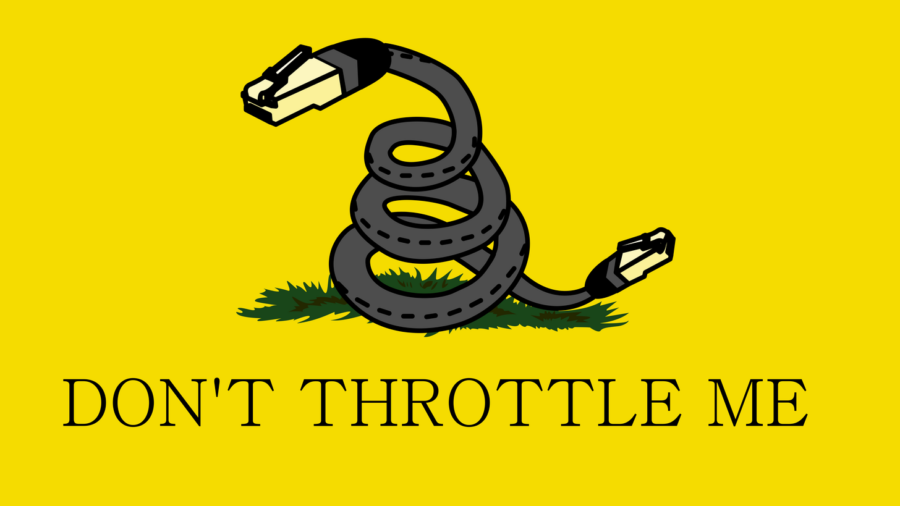Imagine you’re studying for a test and need to find information online. You go to Google, enter the search terms, and suddenly the Internet slows to a crawl. As you wait for the page to load, you see a message from your Internet service provider saying you can upgrade to the Search Engine Package for another $5.99 a month. Of course, that’s in addition to the extra money you’re already spending to access social media websites, video streaming sites, and any news websites that aren’t government-approved.
That’s the future many now fear with the repeal of net neutrality on the horizon. Students and teachers alike are worried about how the loss of net neutrality will impact the state of education, as well as their budgets.
Without net neutrality, Internet service providers could slow down or entirely block off access to any websites they want. They could charge extra to access certain sites, or cause them to load at infuriatingly low speeds to force business away. When students have to choose between paying extra or being unable to access sites that contain information they need, it’s a difficult decision.
“If net neutrality was repealed, my family would have to pay more money to browse certain websites, depending on whether or not they are part of AT&T and its affiliates,” says Natalie Moisa, a student at St. Mary’s College of California. “Net neutrality allows me to browse the Internet without any extra complications, which is how it should be. I should not be forced to use certain websites because I can’t afford to use the ones I want. Money in my family is tight enough, especially in a house with nine people.”
Similarly, teachers are worried that a repeal of net neutrality would not only make it harder for their students to access all the resources the Internet provides, but also negatively impact their abilities to teach.
Hayden Morrison is a teacher at Independence High School. He’s concerned that, without net neutrality, he may be unable to access the information and resources currently available, from video resources to teacher networks through social media.
“My worry for the threat to net neutrality is that this will also threaten a teacher’s ability to gather information to use in the classroom,” Morrison said. “One of the best pieces of advice I have gotten as a new teacher was to avoid ‘reinventing the wheel,’ so to speak – that is to say, I should gather content from other teachers as I see fit, and use that in my lesson planning.”
Morrison elaborates, “My worry is that, with the repeal of net neutrality, access to this information may become all the more limited. One must already be concerned about finding the information in the first place, but if net neutrality is repealed, the concerns only grow. What if the person with the perfect information for me is lost under the sea of other information, never to be found? What if, on my relatively meager teacher’s salary, I cannot afford whatever ridiculously expensive internet package I would need to access it?”
Not only are schools and courses putting more information online for students to access, online courses are becoming common, and have been very convenient for remote or busy students. Jessi Trafton, a student at Santa Rosa Junior College, has been taking online classes, and hopes to soon be able to take a semester entirely online, but fears that without net neutrality, that will be impossible.
“Pay $8.99 for YouTube for a month?” Trafton hypothetically asks. “Guess I’m not watching that video my teacher required, because a sandwich meal at the school would cost about the same. Videos or food? I guess I’d starve for my education.”
However, in the face of all these fears, both students and teachers are taking what action they can. There’s a certain feeling of powerlessness, as those protesting the repeal of net neutrality are struggling to have their voices heard by an uncaring FCC, but they’re still trying to speak up.
“Sending messages to Congress and spreading the word is, sadly, all I have found myself able to do for now,” admits Morrison, but that hasn’t stopped him from sharing links and trying to reach anyone who can make a difference.
Moisa has been trying the same, although she acknowledges that he district representative and state senators are in favor of net neutrality. “Though I have been leaving angry messages to the FCC on their website, pushing the debate on social media, and talking to others about the issue,” she adds.
Overall, though, Moisa, Morrison, and Trafton all feel like their words are reached deaf ears. While that won’t stop them from trying, tensions are high as they worry for the state of the Internet when the FCC has its vote to repeal net neutrality.


